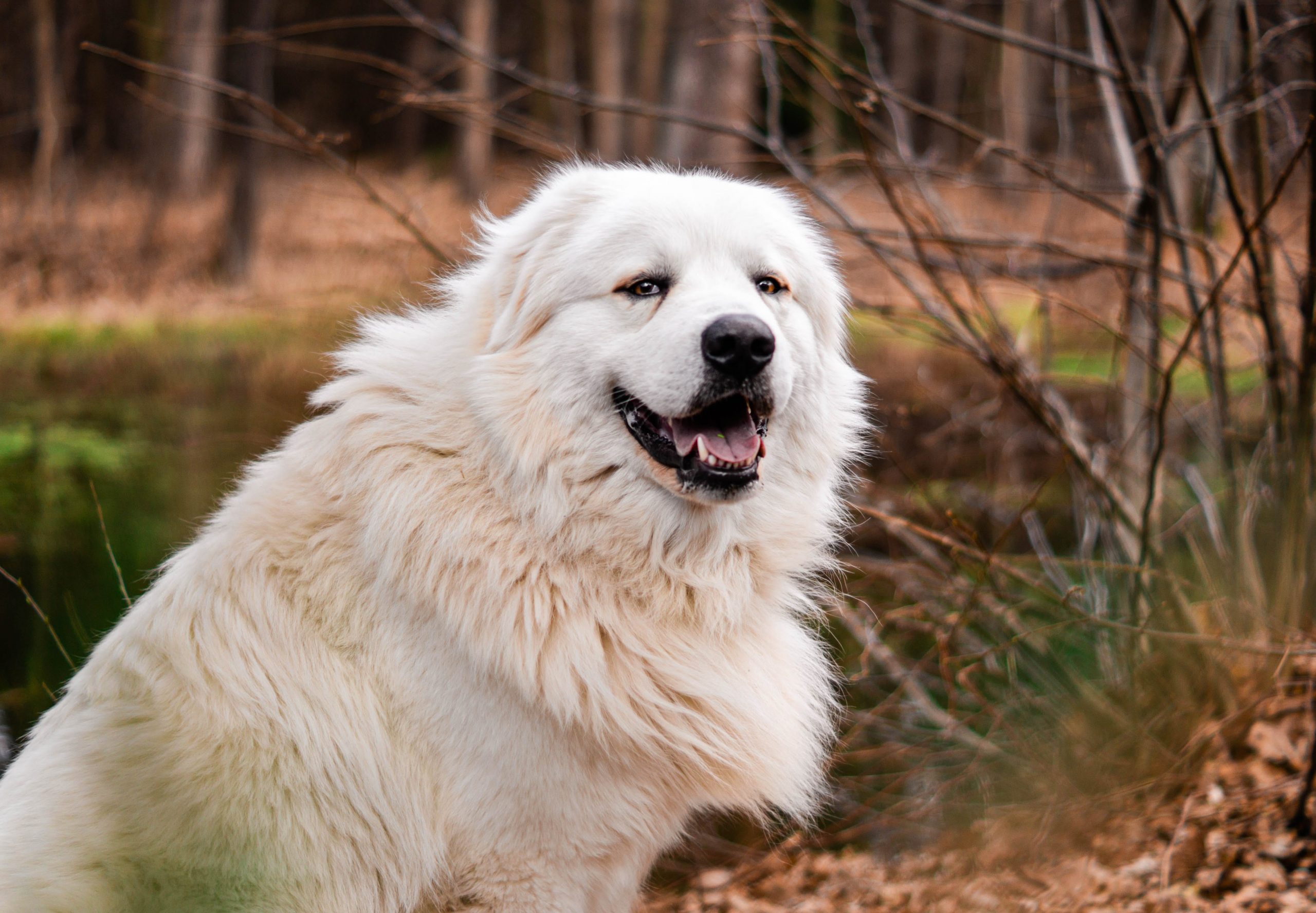Great Pyrenees, renowned for their majestic appearance, gentle disposition, and remarkable guarding abilities, are a breed that stands tall in the hearts of dog enthusiasts.
Originating from the Pyrenees Mountains of France and Spain, these large, working dogs have become cherished companions and guardians. As proud owners of these magnificent canines, it becomes paramount to prioritize their health and well-being, and a fundamental aspect of that is selecting the right dog food.
Great Pyrenees, with their impressive size and robust build, have unique nutritional requirements that necessitate careful consideration. In this comprehensive guide, we will delve into the specific needs of Great Pyrenees and offer insights into making informed choices when it comes to their diet.
From protein and fat requirements to joint health and the avoidance of unnecessary additives, understanding these factors is essential for ensuring a long, healthy, and fulfilling life for your Great Pyrenees.
As we embark on this journey of selecting the best dog food for Great Pyrenees, it’s crucial to recognize that these dogs have a distinct background as herders and protectors.
Their nutritional needs go beyond just meeting the basic requirements; they call for a tailored approach that supports their active lifestyle, robust physique, and potential health predispositions.
In this guide, we’ll explore the key elements of a nutritious diet for Great Pyrenees, shedding light on protein sources, essential fats, the role of carbohydrates, and specific nutrients crucial for their bone and joint health.
Additionally, we’ll highlight some of the leading dog food brands that cater to the unique needs of this magnificent breed, ensuring that your Great Pyrenees receives the nourishment required for optimal vitality and longevity.
Understanding Great Pyrenees Nutritional Needs:
Great Pyrenees, as a large and robust breed, have unique nutritional requirements that must be met to ensure their overall health and well-being. As responsible pet owners, it’s crucial to tailor their diet to support their size, energy levels, and potential health predispositions. Here’s a detailed look at the specific nutritional needs of Great Pyrenees:
Protein Requirements:
Great Pyrenees, being muscular and large in stature, require a diet rich in high-quality protein. Protein is essential for muscle development, maintenance, and overall body function. Look for dog foods that list a high-quality protein source, such as meat, poultry, or fish, as the primary ingredient. Aim for a protein content ranging from 20-30%.
Fat Content:
Adequate fat in the diet is crucial for providing energy, supporting skin health, and maintaining a lustrous coat. Look for dog foods with moderate fat content, preferably sourced from quality sources like chicken fat, fish oil, or flaxseed oil. Aim for a fat content ranging from 10-15%.
Carbohydrates:
While dogs primarily derive energy from protein and fat, incorporating complex carbohydrates into their diet can provide essential fiber and aid in digestion. Opt for dog foods that include wholesome sources of carbohydrates such as whole grains, sweet potatoes, and vegetables.
Calcium and Phosphorus:
Great Pyrenees are prone to orthopedic issues, and maintaining the right balance of calcium and phosphorus is crucial for their bone health. Look for dog foods with a calcium content of around 1-1.5% and a phosphorus content of 0.8-1.2%. This balanced ratio supports proper bone development and helps prevent skeletal issues.
Joint Support:
Due to their large size, Great Pyrenees can be susceptible to joint problems, including hip dysplasia. Choose dog foods that contain glucosamine and chondroitin sulfate, as these ingredients support joint health and can aid in preventing or managing joint-related issues.
Avoid Fillers and Artificial Additives:
To ensure the nutritional quality of your Great Pyrenees’ diet, steer clear of dog foods with excessive fillers like corn, soy, or wheat. Additionally, avoid artificial preservatives, colors, and flavors, as these additives can be detrimental to their health.
Best Dog Food Brands for Great Pyrenees:
Selecting the right dog food brand for your Great Pyrenees is a crucial decision to ensure their overall health and well-being. Here are some top dog food brands known for providing quality nutrition tailored to the specific needs of large breeds like the Great Pyrenees:
Royal Canin:
Product Recommendation: Royal Canin Giant Breed Adult Dry Dog Food
Features: Royal Canin offers breed-specific formulations, including a dedicated formula for giant breeds like the Great Pyrenees. This dog food is designed to support joint health, aid digestion, and provide balanced nutrition suitable for their size.
Blue Buffalo:
Product Recommendation: Blue Buffalo Wilderness Large Breed Adult Chicken Recipe
Features: Blue Buffalo Wilderness is known for its high-protein formulas. This specific recipe is tailored for large breeds, promoting muscle development, maintaining a healthy coat, and supporting overall well-being.
Hill’s Science Diet:
Product Recommendation: Hill’s Science Diet Adult Large Breed Dry Dog Food
Features: Hill’s Science Diet focuses on providing optimal nutrition for large breeds. This dog food includes ingredients like glucosamine and chondroitin for joint health, along with essential nutrients for a healthy immune system and digestion.
Merrick:
Product Recommendation: Merrick Grain-Free Real Texas Beef + Sweet Potato Recipe
Features: Merrick offers grain-free options with real deboned meat as the main ingredient. This specific recipe includes high-quality protein and essential fatty acids, promoting a healthy coat and overall well-being.
Nutro Ultra:
Product Recommendation: Nutro Ultra Large Breed Adult Dry Dog Food
Features: Nutro Ultra provides a holistic approach to nutrition, combining high-quality protein, healthy fats, and antioxidant-rich ingredients. This large breed formula supports joint health and overall vitality.
Purina Pro Plan:
Product Recommendation: Purina Pro Plan Savor Adult Shredded Blend Large Breed Formula
Features: Purina Pro Plan offers a shredded blend formula tailored for large breeds. It includes real meat as the primary ingredient, providing a balance of protein, fats, and carbohydrates for overall health.
Wellness Core:
Product Recommendation: Wellness Core Grain-Free Large Breed Dog Food
Features: Wellness Core focuses on grain-free, high-protein recipes. This particular formula is designed for large breeds, emphasizing lean protein sources and essential nutrients for optimal health.
Conclusion:
Selecting the best dog food for your Great Pyrenees is a pivotal aspect of responsible pet ownership, impacting their overall health, vitality, and longevity. As we conclude this comprehensive guide, it’s evident that understanding the nutritional needs of Great Pyrenees is essential for making informed choices about their diet.
By prioritizing factors such as protein, fat, carbohydrates, calcium, phosphorus, and joint support, you can ensure that your Great Pyrenees receives a well-balanced and tailored diet.
The recommended dog food brands mentioned earlier, such as Royal Canin, Blue Buffalo, Hill’s Science Diet, Merrick, Nutro Ultra, Purina Pro Plan, and Wellness Core, are known for their commitment to providing quality nutrition for large breeds like the Great Pyrenees.
Always remember that each Great Pyrenees is unique, and their nutritional requirements may vary based on factors like age, weight, and health conditions. Regular consultations with your veterinarian are crucial for fine-tuning your dog’s diet to meet their individual needs.
In conclusion, the journey to finding the best dog food for your Great Pyrenees is an ongoing commitment to their well-being. By prioritizing a nutritionally balanced diet, you are not only contributing to their physical health but also ensuring they lead a happy, active, and fulfilling life as the majestic companions and guardians they are known to be. With the right diet and proper care, your Great Pyrenees will continue to thrive, bringing joy and companionship to your home for years to come.
FAQs
Q: How much should I feed my Great Pyrenees?
A: The amount of food depends on factors such as age, weight, activity level, and the specific dog food being used. Consult with your veterinarian to determine the appropriate portion size for your Great Pyrenees.
Q: What is the ideal protein content for Great Pyrenees dog food?
A: Aim for a dog food with a protein content ranging from 20-30%. This supports their muscular build and overall health.
Q: Are there specific dietary considerations for Great Pyrenees’ joint health?
A: Yes, Great Pyrenees are prone to joint issues. Look for dog foods with added glucosamine and chondroitin sulfate to support joint health and prevent problems like hip dysplasia.
Q: Can I feed my Great Pyrenees a grain-free diet?
A: While some dogs thrive on grain-free diets, it’s essential to consult with your veterinarian. Some grain-free diets may lack necessary nutrients, so choose a high-quality option with balanced nutrition.
Q: Are there specific supplements recommended for Great Pyrenees?
A: Your veterinarian may recommend specific supplements based on your dog’s individual needs. Common supplements for Great Pyrenees include omega-3 fatty acids for coat health and joint supplements for overall joint support.
Q: How often should I switch my Great Pyrenees’ food?
A: Gradual food transitions are recommended to avoid digestive upset. If you plan to switch dog foods, do so over 7-10 days by gradually mixing the old and new food.
Q: Can I give my Great Pyrenees human food or table scraps?
A: It’s generally not recommended to feed dogs human food or table scraps, as some foods can be harmful. Stick to a well-balanced, nutritionally complete dog food to meet their dietary needs.

Jane Doe, a veterinarian with over 10 years of experience, combines her deep knowledge of animal health with a passion for pet welfare at PetsPonder.com. With a DVM degree and a commitment to the latest in veterinary science, Jane Doe offers reliable, compassionate advice to help pet owners make informed decisions for their furry companions.

Leave a Reply